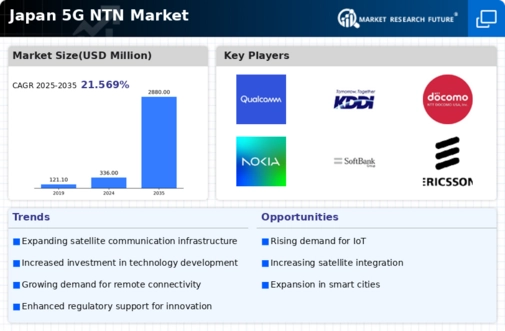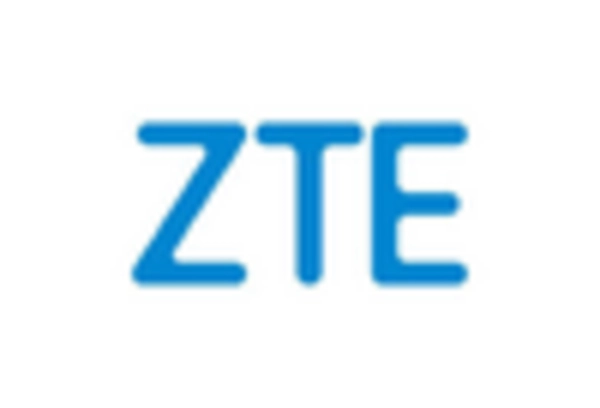Rising Demand for IoT Applications
The proliferation of Internet of Things (IoT) devices in Japan is significantly influencing the 5G NTN Market. As of November 2025, it is estimated that there are over 1 billion IoT devices in use across the country, with projections indicating a growth rate of approximately 15% annually. This increasing demand for IoT applications necessitates robust and reliable connectivity solutions, which 5G networks can provide. The 5g ntn market is poised to benefit from this trend, as businesses and consumers alike seek to leverage IoT technologies for smart homes, industrial automation, and smart city initiatives. The ability of satellite networks to offer extensive coverage and support a vast number of connected devices positions them as a vital component in meeting the connectivity needs of the burgeoning IoT ecosystem.
Increased Focus on Rural Connectivity
The 5G NTN Market in Japan is being driven by an increased focus on improving connectivity in rural areas. As urban centers become saturated with high-speed internet options, the need for reliable communication solutions in less populated regions has become more pronounced. The government and private sector are collaborating to deploy satellite networks that can bridge the digital divide, ensuring that rural communities have access to the same level of connectivity as urban areas. This initiative is expected to enhance economic opportunities in these regions, potentially leading to a 20% increase in internet penetration rates over the next few years. The emphasis on rural connectivity is likely to propel the growth of the 5g ntn market, as stakeholders recognize the importance of inclusive access to technology.
Government Initiatives and Investments
The Japanese government is actively promoting the development of the 5G NTN Market through various initiatives and investments. In November 2025, the government announced a funding program aimed at enhancing satellite communication infrastructure, with an allocation of ¥100 billion ($900 million) over the next five years. This investment is expected to stimulate research and development in satellite technologies, fostering innovation and competitiveness in the market. Additionally, regulatory frameworks are being established to facilitate the deployment of satellite networks, ensuring that they meet the necessary standards for safety and efficiency. These government efforts are likely to create a favorable environment for the growth of the 5g ntn market, attracting both domestic and international players to invest in Japan's satellite communication landscape.
Emerging Applications in Autonomous Vehicles
The rise of autonomous vehicles in Japan is creating new opportunities for the 5G NTN Market. As of November 2025, the automotive industry is increasingly integrating advanced communication technologies to support vehicle-to-everything (V2X) communication, which is essential for the safe operation of autonomous vehicles. The need for real-time data exchange between vehicles, infrastructure, and cloud services necessitates a robust and low-latency communication network, which 5G can provide. The 5g ntn market is likely to benefit from partnerships between automotive manufacturers and satellite communication providers, as they seek to develop solutions that enhance the safety and efficiency of autonomous driving. This emerging application is expected to drive significant investment in satellite networks, further solidifying their role in the future of transportation.
Technological Advancements in Satellite Communication
The 5G NTN Market in Japan is experiencing a surge due to rapid technological advancements in satellite communication. Innovations in low Earth orbit (LEO) satellite technology are enabling faster data transmission and reduced latency, which are critical for 5G applications. As of November 2025, Japan has seen a notable increase in satellite launches, with over 30 new satellites deployed in the past year alone. This expansion is expected to enhance connectivity in rural and remote areas, thereby broadening the market's reach. Furthermore, advancements in antenna technology and signal processing are likely to improve the overall efficiency of satellite networks, making them more attractive for various industries. The integration of these technologies is anticipated to drive growth in the 5g ntn market, as businesses seek reliable and high-speed communication solutions.
















